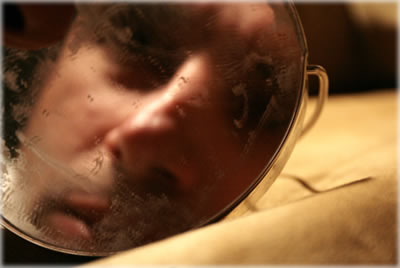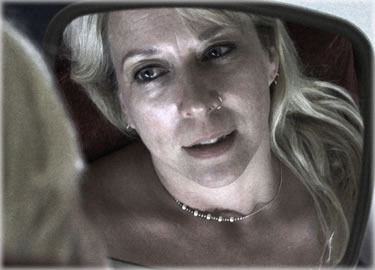
| Feb. 13, 2008 Introduction | Part One | Part Two | Part Four | Part Five | Part Six | Horoscope | Link to This Subscribe to this series. The Problem of Self Esteem Dear Friend and Reader: THOUGH IT MAY be difficult to see, we have a serious self-esteem problem in our society. We are, in short, either taught that we don't exist, taught to hate ourselves, or some combination of the two. Most people you see walking around on the street don't feel worthy of love. And this seems to be a matter of selflove, or the lack thereof.
If we are lacking self-esteem -- a problem so pervasive as to be invisible -- we are going to have a lot of problems in relationships. This can account for much of our stuff around jealousy. For example, if we need a relationship to know that we exist, then we will naturally feel that our existence is threatened if our partner so much as smiles at someone else. If much of our trip in relationships is designed to cover up a lack of real self-awareness, we are adding several dense layers of complication to finding out who we really are. It would seem that the real solution to our relationship stuff, our jealousy, our loneliness and many other factors, is to figure out who we are, enter a conscious relationship with that person, and then take that into our relationships with others. In other words, we need to get to the place where the most honest relationship we have in the world is with ourselves, and then let that overflow into our encounters with the people around us -- not forgetting what order these things happen. Unfortunately, we are taught to have relationships with ourselves that are based specifically on denying and deceiving ourselves. This is a sad state of humanity, but one that could be easily addressed -- if we were somehow relieved of the fear to look within. In today's edition, I cover some points that have been raised over and over again, but which need to be repeated and I hope thought through. None of what you will read today is particularly original. We may feel that feminism has covered a lot of this ground, but it's been a long time since. And a lot of things have happened since. When Ronald Reagan took office in 1981, during his first season in office, he hired the Heritage Foundation to lobby Congress for something called Abstinence Only sex "education." This is a program, taught in public schools and elsewhere, that indoctrinates kids to remain abstinent until heterosexual marriage. Kids are taught that birth control does not work. Masturbation and homosexuality are not mentioned. It is direct denial sex education. You pay to have this taught in public schools. We now have a whole generation, more really, of people who were raised with this influence. Before we can start to address the damage, we need to figure out what it is. That is going to take a while, and it's going to take some deep introspection when that is usually the last thing on our minds. To do this, we're going to need to talk about sex, something that most of us are poorly equipped for, and generally embarrassed to do.
Compersion is most often defined as the opposite of jealousy. It starts with getting turned on by what turns your lover on; by getting turned on by their pleasure, their thoughts, their desires. It's taking what would normally make you jealous and turning it into a source of concentrated pleasure. However, I have an expanded definition. As for masturbation, we will return to the scene of a crime committed in or around 1712. That crime involved one author defining masturbation as a supposed medical disease called onania, and as a special moral blight that needed to be rectified at all costs. That cost involved a product he was selling to cure the disease of masturbation. What could have been a source of introspection, learning and self-fulfillment was turned into an attack on nature. This mythology, starting with one pamphlet in London, spread its way to the highest echelons of society across Europe, and then to North America where the philosophy propagated in the colonies and has carried forth to the present day. Many of our relationships today are based on a lack of individuality and missing sense of existence. We rely almost exclusively on "one special other" as a source of fulfillment. Many people are desperate for sex or feel trapped because masturbation is lonely, unfulfilling and supposedly shameful. It did not start that way; it was made that way. Imagine if we could turn that around; if we could (on a culture-wide level) make masturbation hot and satisfactory, and then start our partnerships from a solid, level place, and then seek out one another to share from there. It would be a whole different world. We're not in that world yet, but we can surely get there if we want. What Would Lincoln Say? ONE OF my many ideas for films and novels tells the story of the wife of an extremely wealthy, well-connected corporate executive. He's an absentee husband, and day after day for years, he leaves her stranded in this huge suburban house without any money or the ability to travel. He does whatever he wants; her credit card has a $500 limit. It is a kind of 'passive' abuse, and it goes on for a long time. She is basically his prisoner, trapped in a 16-room mansion, supervised by maids who come in to spy on her and report any suspected transgression. Finally one day she gets sick of it.
They go through the usual divorce route in state court, but his powerful lawyers, with their connections all over the legal system, do a great job of stonewalling her. They use various tactics to create delays, stop the paperwork, and fight her pleadings on every possible level. Finally it becomes obvious they are not going to get a divorce by the normal route. And why is he doing this? There could be many "reasons" -- mainly, he is a control freak. It's just the kind of guy he is. And to think, he seemed so charming. Her lawyer, a young woman recently out of law school with training in civil rights issues, comes up with a novel legal theory. She brings a divorce suit in federal court based on the 13th Amendment, which prohibits slavery. They argue that the marriage contract (that is, the state marriage license), as written and as it's being applied in this case, is equivalent to a form of illegal servitude and that her constitutional rights are being violated. This is laughed at by his lawyers and in the media -- it's considered a legal absurdity. Indeed, there is a public backlash against their lawsuit. But everyone gets the irony; it's impossible to miss. To everyone's surprise, however, the federal judge grants a trial -- and then her divorce. He does nothing else; it's all the relief they've asked for (she hasn't even asked for alimony or damages; now it's all strictly on principle). His lawyers, in response, rush into federal appellate court and manage to stay the decision; then they get it thrown out. Her undaunted young lawyer, in response, files with the United States Supreme Court, and after a long wait, with much attention, public abuse and bantering on talk radio, they are granted certiorari: the Supreme Court will take their case. Imagine the headlines in The New York Times: "Divorce Case Goes to Nation's Highest Court." Or The Wall Street Journal: "What Would Lincoln Say?" (Lincoln is credited with freeing the slaves; the 13th Amendment came later.)
She also proves that structurally, it puts women at a disadvantage to the extent of negating her existence, and is therefore inherently unfair to one of the parties. She mentions that how the contract has been applied is equally meaningful as what the contract says. And she argues that in all 50 states, marriage contracts basically say the same thing: all of which violates the 13th Amendment because one person is, in effect, taking possession over another person. The court hears arguments in a packed, dramatic scene. A couple of months later, a decision is published that dissolves her marriage and, in the same gesture, declares all marriage licenses unconstitutional. Basically, they are all found to be null and void, and one morning everyone in the United States and its territories wakes up legally single. Not divorced -- annulled. They can stay in their relationships voluntarily, or walk out the door if they want. One Orgasm and We're Married Marriage is an old idea (we don't know how old). Though there are other concepts of established relationship in the world, it's the only socially acceptable one that we live with in mainstream culture today. The problem with questioning old things is that it seems ridiculous, like arguing against the existence of sidewalks. But this is much more personal, and marriage is a sacred cow. When I say marriage, I mean one-on-one marriage and its derivatives; the forms of relationship that are modeled after it. Deep in the core of marriage (as we know it, in our patriarchal and patrilineal society) are two ideas: that people are not complete until they are joined with another; and that a woman can be taken as the property of a man.
True, people get married for a lot of reasons -- sometimes it's authentic abiding love, sometimes it's to have companionship, sometimes to get out of the house. Still, I wonder what's going on when a 19-year-old is talking about finding a "life partner." Marriage has an odd property: you enter the relationship and, like a building without a fire exit, there is no obvious way out. To the extent that there is one, you don't usually think about it. Divorce is not usually mentioned until it is imminent. Despite the high divorce/multiple remarriage rate, and the well-known extent of problems within marriages, children are conditioned to eventually become married as a primary life goal from a very young age. This conditioning comes from rabbis, preachers and other holy men, parents, Disney movies, lots of other movies, magazines and every conceivable channel. For many people, it is all that they want out of life. Most people do not have the integrity, the stamina or the creativity to challenge this. Most don't have a clue anything else is possible. Danielle writes: "For so many, they are no one until they're married. They are less of a person without 'another half'. The number of times I hear about people (particularly Midwestern stories) who are interrogated for being single! It infuriates me. I hear from friends who are single or coupled questions like, "So when are you getting married? You're not married yet? Why aren't you married yet? So, do you have a boyfriend? Oh, well why not? You're such a lovely girl. Don't worry, you'll find someone." We think we have options to marriage, such as having a boyfriend or girlfriend, or living with a partner, but the core template of the relationship is the same. The relationship models we have all presume the concept "my," meaning possession. We are "taken." The arrangement includes a method of getting in, without a conscious idea of getting out. In other words, it is presumed to be permanent. In most situations, to end the relationship, you have to smash it and with it, the feelings of at least one of the people involved -- and there may be a lot of people. Of all the agreements you think would benefit from a five-year term limit, marriage might be tops on the list. What's the big deal? If you're happy, you would renew. If you're not, you would move on. Of course, if that were the case, why would you need it at all? To the extent that there is a dating ritual, it is designed to find a person to engage in one of these possessive, supposedly exclusive relationships with. From those encounters, the process of becoming indentured or bonded can proceed very quickly, such as by the second date. We usually forget the astonishing social, cultural and religious pressure to think this way. And this is not to deny the many happily married people their existence, but rather to shed some light on what may be going on for those whose experience is not as productive. Or as one of my friends wrote to me recently, it takes her just one orgasm and she wants to get married -- which seems more of a comment on the incredible cosmic bonding power of sex. The other acceptable relationship mode is blowing off steam -- you have sex willy-nilly with people who you don't usually talk to again, if you even remember their name in the morning. People (even women) are presumed by the culture to be entitled to brief phases of promiscuity to sow their wild oats, but only when they are relatively young. If you do this when you're older, it's presumed you've got a problem. Often, these promiscuous phases are motivated by anger, revenge and jealousy -- not seeking pleasure, human contact or creative adventure. Generally, alcohol is involved: not a little; usually, quite a lot.
Whatever may be a natural thing for a human to do -- we don't know, because we've gone so far from it -- there is incalculable social pressure to behave within extremely strict rules that, as it happens, rarely ever follow the natural course of human emotion or desire. Both sanctioned forms of relationship, marriage or temporary promiscuity, imply that relationship is about property: in one case, property you keep, and in the other, property you dispose of. There are people who practice alternatives. Maybe you're friends with a few; maybe you don't even know it. They have good reasons to keep quiet: for example, a judge can take away their kids. It's considered weird to have an open marriage, to be polyamorous, or to stay single and have sex with your friends. If you're married and are secretly lesbian or bisexual, you live a hidden double life -- for a reason. If you are openly bisexual, it is usually presumed that you will be serially monogamous and only have relations with one sex or the other at a time. The most acceptable option to the marriage/promiscuity dichotomy -- and the nearly total lack of alternative relational options/models -- is the one that the Church has advocated for millennia: celibacy. What we think of as celibacy today implies masturbation, but that part we keep quiet. Could you imagine the cover of Redbook blazing out this headline, top left -- Single? Here's How to Make Your Masturbation Hotter than Ever! Or, Plunge In! This Years Sweet New Dildos. Never. It's always some form of, "Single? Find a Guy!" Note, this signal is sent constantly to teenage girls who really need to be taught about masturbation in some detail. It would be a fun, easy way to save them, their families and society a lot of serious problems. The reason masturbation (pleasure for its own sake) is less tolerable than teenage sex is that it does not inherently lead to marriage; it emphasizes independence and autonomy; and this is apparently dangerous. Men have the socially tolerated option of seeing a prostitute, though I have yet to meet one besides myself who openly admits having done so. Imagine the cover of GQ -- Finding the Right Sex Worker. (I better write that one.) All alternatives to the standard fare are shrouded in a gray area of secrecy, denial and doubt (we'll come to this soon -- it's the 12th house of astrology).
If you are polyamorous (someone who practices conscious nonmonogamy), others may be polite toward you, but most will presume that there must be "something missing" from your relationship, which is why you have other love interests. (And if you have kids, please do not go on TV and talk about it.) Truly, I am happy ever to see a positive response outside the poly community itself. Many people know they would adore having a couple of lovers, so I imagine there would be some secret jealousy. Or, if you're a man and openly say you're poly, you will likely be presumed by many in the straight world to be an kind of polite womanizer whose primary partner has no self-esteem. A few people will be secretly envious, but will likely keep that quiet to. Who knows, I don't get out a lot. Maybe times are changing. I have spent a fair amount of time in the swing community, where married couples come to a place and have sex with others. I am here to tell you that, despite the apparent sexual sharing, these are some of the most conventional marriage arrangements in existence. The couples are almost always strictly a unit; no matter what you are doing, you are still half of a couple. In many places you are not welcome to begin with unless you are part of a couple. In general, swingers practice something called "emotional monogamy" -- you fuck other people, but you're not allowed to have feelings for them. Ain't that grand? Here is another one that probably won't shock you: in nearly every couples-oriented swing club on the planet (I personally know of just one exception), female-female bisexuality is encouraged and made a spectacle out of. If a man touches another man, he is usually banned from the club for life. We need, I think, to pause and ask ourselves what is going on here. In the liner notes to one of my favorite Dylan albums, Bob remarks: "Romance is taking over. Tolstoy was right." Or maybe my friend was right: one orgasm and marriage floods in. If we go back to sex and what it is -- not just what it represents -- we might learn something. Humans are the only critters like ourselves that we know of; the supposed Crown of Creation. We "come" into existence through sex. We transmit the data collected in countless millennia through one egg cell and one sperm cell that miraculously join in an act of sexual encounter. On the level of awareness, we learn about ourselves through sexual experiences (including masturbation). We experience the cosmic bliss of surrendering the ego. Oh! That thing. Maybe all this elaborate, morbid choreography around relationships involves the void of any other sense of identity besides the ego. So we need these relationships to establish and perpetuate its existence. If we need an "other" to have a "self," maybe that's because we don't have a self in the first place. All this property right stuff in relationships seems to be about sex -- but as Hannah said, well, it ain't about sex. Thanks for tuning in. |






